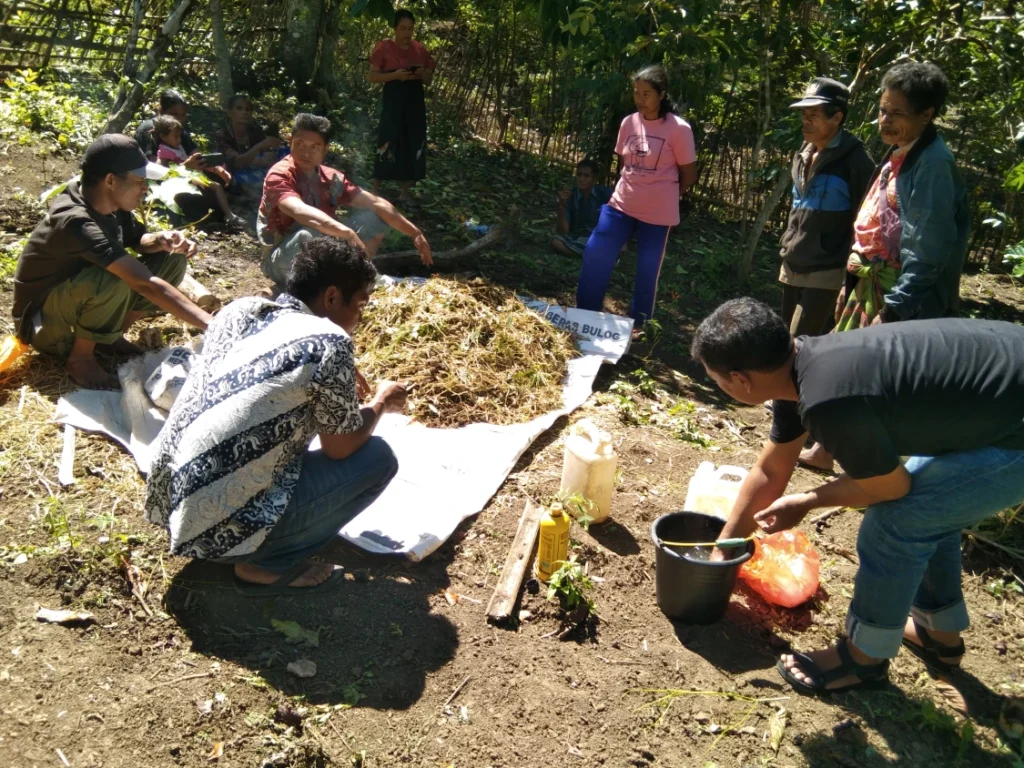On Monday, April 13, 2024, LBL held an organic fertilizer production training for indigenous communities in Wanggameti Village, Matawai Lapau District, East Sumba Regency, NTT. This training was held in a garden owned by Mr. Jhon Kembi to allow participants to directly practice the knowledge gained on site.
This training was attended by 10 representatives of the Wanggameti indigenous community. With the material delivered by two trainers from the Sumba Koppesda Institution, namely Yohanis H. Meha and Ignasius U. Ana Bolu. This activity aims to provide knowledge to the Wanggameti indigenous community about processing local materials. Such as leaves into organic fertilizer to increase soil fertility in their agricultural land.
So far, people have tended to use chemical fertilizers which can damage soil nutrients if used continuously. Therefore, LBL seeks to encourage the use of local materials that are environmentally friendly and cheaper through this training.
Erik Nggaya Maramba, a facilitator for the Wanggameti indigenous community, emphasized that organic fertilizers can help restore soil fertility that has been degraded by the use of chemical fertilizers. He hopes that the community can see the great benefits of organic fertilizers and start switching from using damaging chemical fertilizers.
Resource person Ignasius UR Anabuni explained that fertilizer is an additional nutrient that is given to the soil or sprayed on the leaves. So that plants grow well and produce abundant harvests. He also emphasized the importance of using organic fertilizers, especially in less fertile soil. Local ingredients for making organic fertilizers, such as brown sugar or granulated sugar, EM4, leaves such as gamal leaves, calliandra, leaf lontoro, leaf the ball, and straw bran, are easily accessible and inexpensive compared to chemical fertilizers.
The process of making organic fertilizer explained by Ignasius involves simple steps. Basic ingredients such as leaves are mixed with brown sugar, EM4, and sufficient water, then stirred evenly and stored in a tarpaulin for the fermentation process for approximately three weeks. After that, the fertilizer is ready to be used for food crops and horticulture.
After delivering basic material, the training continues with direct practice. Participants are invited to collect basic ingredients, mix them, and start the fermentation process according to the resource person's directions.
Mr Jhon Kembi, one of the training participants, expressed his gratitude to LBL and resource persons from the Koppesda Foundation. He expressed his joy because this training provided new knowledge that was very useful and easy to apply. He promised to adopt this technology for making organic fertilizer in his group and in their respective gardens.
This training not only provides technical knowledge but also opens people's insight into the importance of maintaining soil fertility in a sustainable manner. By using local materials around them, the people of Wangga Meti Village are expected to be able to increase their agricultural productivity without damaging the environment. This activity is a significant first step in efforts to educate and encourage positive change among local indigenous communities.
*This article was written by: Bumi Lestari Institute


